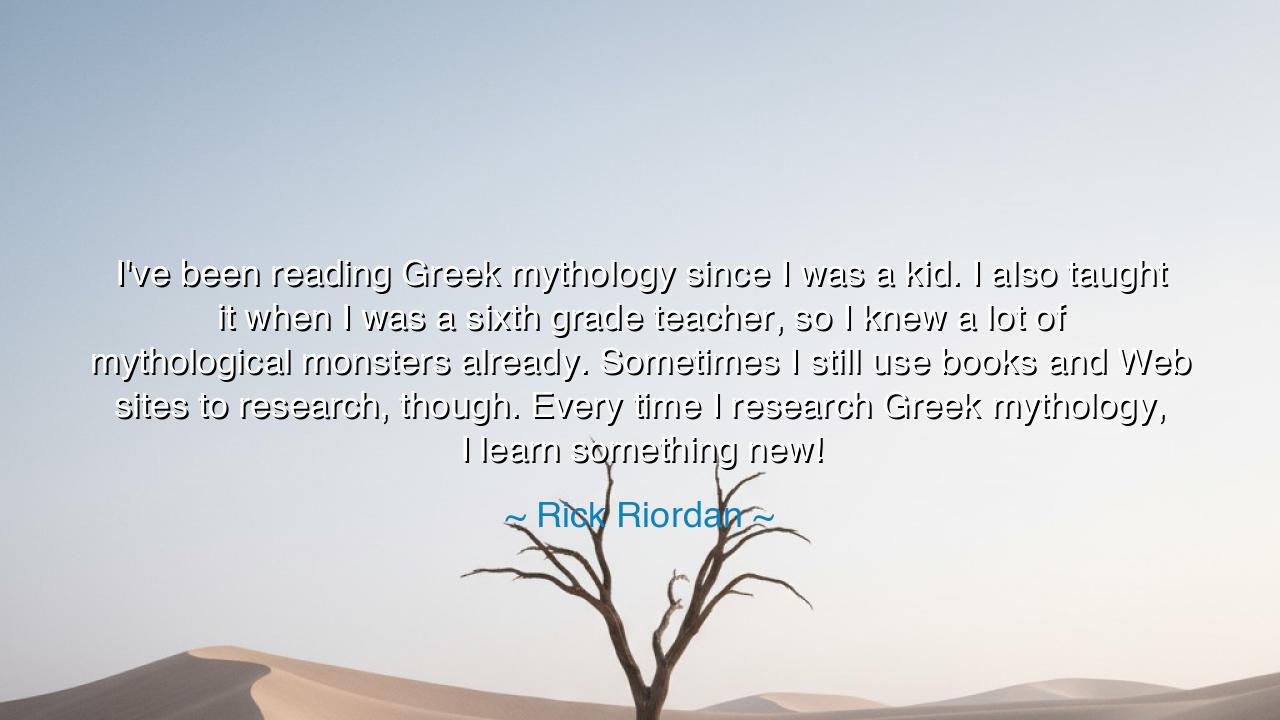
I've been reading Greek mythology since I was a kid. I also
I've been reading Greek mythology since I was a kid. I also taught it when I was a sixth grade teacher, so I knew a lot of mythological monsters already. Sometimes I still use books and Web sites to research, though. Every time I research Greek mythology, I learn something new!






Hear the voice of Rick Riordan, teller of tales and shaper of myth for a new generation: “I’ve been reading Greek mythology since I was a kid. I also taught it when I was a sixth grade teacher, so I knew a lot of mythological monsters already. Sometimes I still use books and Web sites to research, though. Every time I research Greek mythology, I learn something new!” These words carry more than a simple confession of study—they reveal the eternal nature of stories, and the truth that no matter how many times we return to them, they yield new treasures for the one who seeks.
The power of Greek mythology lies in its inexhaustible depth. These ancient tales of gods and heroes, of beauty and terror, of triumph and downfall, are not static relics but living rivers. To drink from them once is to taste wonder; to drink again is to find meanings not seen before. Even the seasoned teacher, like Riordan, returns again and again, discovering fresh truths hidden in the folds of the myths. This is the sign of a true classic: that it grows with us, revealing more as we mature, as though the stories themselves are alive and speaking differently with each season of our lives.
The monsters of mythology, which Riordan recalls with delight, are not merely creatures of imagination—they are mirrors of the human spirit. The Hydra, with its many heads, symbolizes challenges that multiply when ignored. Medusa, with her petrifying gaze, reflects the paralyzing power of fear. The Minotaur, lurking in the labyrinth, speaks of the wild beast within each soul that must be confronted. To teach these monsters to children is not only to entertain but to arm them with symbols through which they may understand their own struggles. Thus the myths endure, for they whisper truths of the human condition in the guise of gods and beasts.
The ancients themselves revered these tales not as idle fantasy, but as guides for life. When Homer sang of Achilles’ wrath or Odysseus’ long journey home, he was not merely recounting adventures—he was teaching generations about rage, grief, endurance, and longing. The Athenian dramatists, such as Sophocles and Euripides, took myths and wove them into tragedies that forced citizens to wrestle with justice, pride, and fate. And even today, as Riordan says, each time we return to Greek mythology, something new shines forth, for the human heart is never finished learning from its own reflection.
Consider the story of Theseus, who entered the labyrinth to face the Minotaur. To one reader, it is a tale of courage; to another, a parable of cunning and guidance, for without Ariadne’s thread, Theseus would have perished. To yet another, it speaks of sacrifice, of leaving behind innocence to face the chaos of adulthood. One story, many lessons—revealed anew to each soul who dares to enter its depths. So too with all myths: they are labyrinths in which we wander, and every turn shows us something we had not seen before.
The meaning of Riordan’s words is that learning never ends—not even in what we think we already know. To study myths as a child, as a teacher, and as an adult researcher is to walk the same path with different eyes. Knowledge is not static; it grows with us. And the stories of the ancients, because they touch what is eternal, will always reveal more to the one who approaches with humility and curiosity.
The lesson for us is simple yet profound: return often to the great stories, the sacred texts, the timeless myths. Do not say, “I already know them,” for like the sea, they change with every tide. Read them as a child, read them as a youth, read them as an elder, and each time they will speak to you differently. Let the monsters remind you of your struggles, let the heroes remind you of your strength, let the gods remind you of the mysteries that still lie beyond human grasp. And never cease to research, to question, to seek, for wisdom is a well that never runs dry.
So let Riordan’s words endure: “Every time I study Greek mythology, I learn something new.” Carry them as a reminder that no knowledge is ever exhausted, no story ever fully spent. Approach life itself as mythology—an endless tale in which every return, every reflection, every retelling uncovers new meaning. Thus you will walk as both student and teacher, always learning, always teaching, always discovering the sacred fire in the stories that have shaped humanity since the dawn of time.






AAdministratorAdministrator
Welcome, honored guests. Please leave a comment, we will respond soon